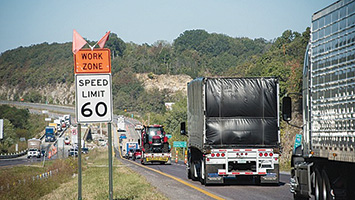By TIM ROWDEN
Managing Editor

The Infrastructure Investment and Jobs Act, passed by the Senate on a 69-30 vote Aug. 10, and now awaiting further action in the House, would invest approximately $1.2 trillion in federal resources over the next five years, including $567.4 billion in new infrastructure spending and $93.5 billion in additional funding authorizations.
The bill includes:
- $351 billion for highways and bridges.
- $107 billion for transit.
- $73 billion for electric grid infrastructure.
- $66 billion for passenger rail.
- $55 billion for drinking water infrastructure.
- $42 billion for broadband deployment.
- $25 billion for airports.
- $17 billion for ports.
- $7.5 billion for electric vehicle charging stations.
- $7.5 billion for electric buses and ferries.
ONCE-IN-A-GENERATION INVESTMENTS
Illinois senators Democrats Tammy Duckworth and Dick Durbin, both voted in favor of the plan. Missouri Senator Josh Hawley voted against it while Senator Roy Blunt voted for it.
“This Bipartisan Infrastructure Deal makes significant and substantial investments in our public health, global competitiveness and economic prosperity by rebuilding our crumbling infrastructure, expanding access to critical broadband services for students and working families and upgrading our nation’s water systems,” Duckworth said. “Illinoisans know how critical this funding is to communities all across the state, and I will do everything I can to ensure this compromise is signed into law to support good-paying jobs for hardworking families throughout Illinois.”
Durbin, Illinois’ senior U.S. senator, said constituents have come to his office for years asking when Congress would get around to passing an infrastructure bill.
“We have finally reached that moment in the Senate,” Durbin said. “This bipartisan bill makes once-in-a-generation investments in public transit, passenger rail, drinking and waste water, broadband, and roads and bridges. It also expands electric vehicle infrastructure and battery research to help usher in an era of zero-emission vehicles. Illinoisans from Chicago to Cairo will see the tangible impacts of this bill and the jobs it will create.”
MISSOURI SENATORS SPLIT
Missouri’s delegation split on the plan, with Blunt, who is retiring next year, among the 19 Republicans who voted “yes,” and Hawley voting “no.”
“As a national transportation hub, Missouri is among the states that will benefit the most from the targeted investments in this bipartisan infrastructure bill,” Blunt said in a statement following the final vote. “Location is one of our greatest competitive advantages in Missouri. The investments in this bill will help us maintain that advantage and improve the quality of life for families, businesses, and farmers.”
Hawley, Missouri’s junior senator, consistently opposed to the deal, and voted “no” both to advance the bill and to pass it.
Missouri and Illinois investments
In Missouri and Illinois, states where infrastructure has suffered from a lack of adequate funding for decades, the need for action is clear. The American Society of Civil Engineers gives both states a C- grade on its infrastructure report card:
- Illinois has been working to address its most pressing infrastructure needs with the state’s Rebuild Illinois capital improvement program, putting union members to work making $45 billion worth of improvements to roads, bridges, railroads, universities, early childhood centers and state facilities, paid for through a combination of increases to the state’s motor fuels tax and vehicle title and registration fees.
- Missouri legislators approved a plan this year to implement the state’s first gas tax hike in 28 years, incrementally increasing the gas tax to 29.5 cents per gallon by 2025 to put toward road and bridge improvements. The bipartisan infrastructure plan approved by the Senate last week would significantly boost those efforts.
Here’s what the Infrastructure Investment and Jobs Act includes for Missouri and Illinois:
ROADS AND BRIDGES
• Illinois – $9.8 billion for federal-aid highway apportioned programs and $1.4 billion for bridge replacement and repairs. The state will be eligible for billions more in competitive grant programs.
• Missouri – $6.5 billion for federal highway programs and $484 million for bridge repairs and replacements over the next five years. The state also has the opportunity to bid for a $12.5 billion investment in its bridges through the Bridge Investment Program and a $16 billion allotment for major projects aimed at economic development.
PUBLIC TRANSPORTATION
• Illinois – $4 billion over five years to improve public transportation options across the state.
• Missouri – $670 million over the next five years. The White House estimates that 32 percent of Missouri’s public transit vehicles and 21 percent of Illinois public transit vehicles have exceeded their useful lifespans. Commuters in Missouri spend an extra 80 percent of their time on the commute, the White House said. In Illinois, that average is 68.3 percent.
BROADBAND
• Illinois – A minimum allocation of $100 million to help provide broadband coverage across the state, including providing access to the at least 228,000 Illinoisans who currently lack it.
• Missouri – A minimum of $100 million to improve the state’s broadband infrastructure, including providing access to more than 330,000 residents who currently don’t have it.
ELECTRIC VEHICLES
• Illinois – $149 million over five years to support the expansion of the electric vehicle (EV) charging network.
• Missouri – $99 million over the next five years to expand the state’s electric vehicle (EV) charging network.
Both states also are eligible to vie for $2.5 billion in competitive EV charging grants.


